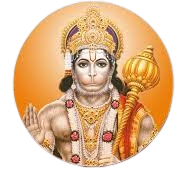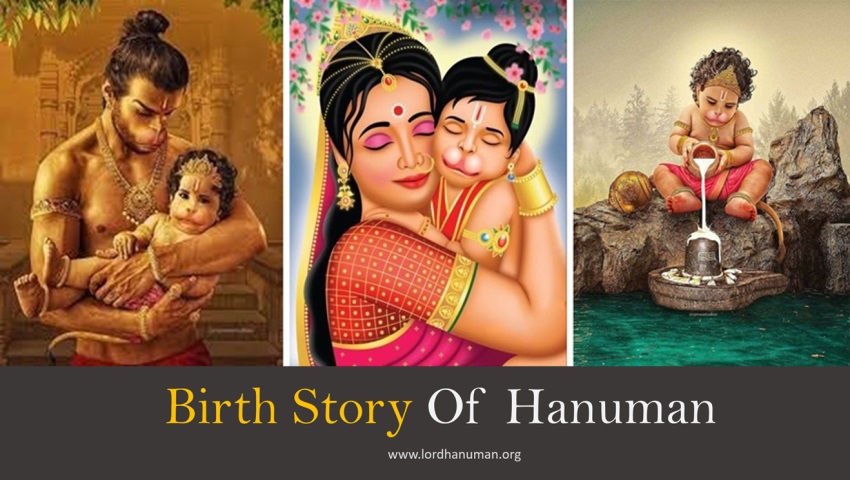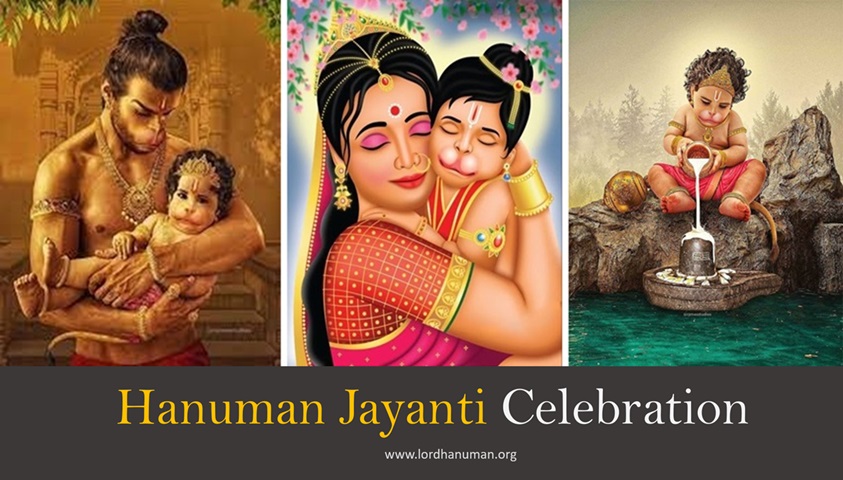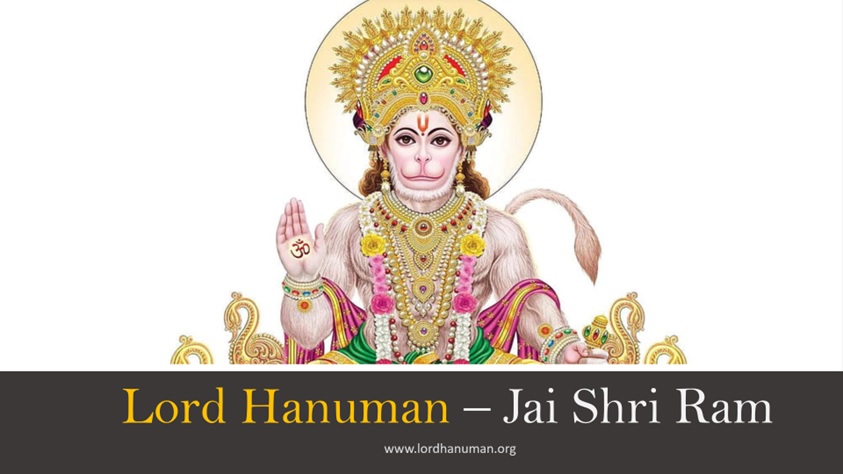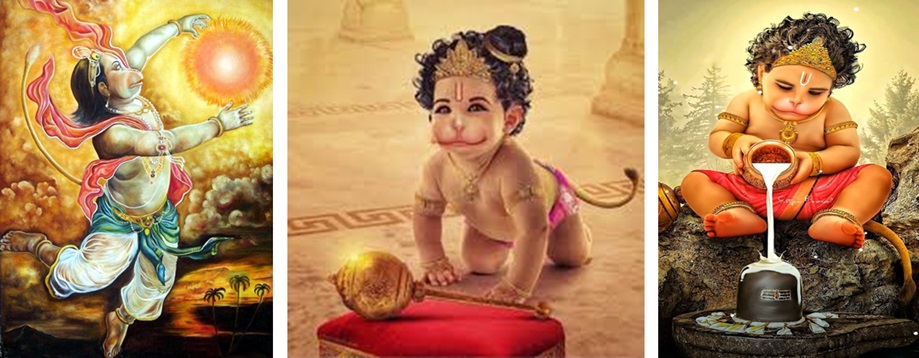
Birth Of Hanuman
हनुमान जी का जन्म
हनुमान जी की जन्म कथा
Birth Story Of Hanuman. Born to Anjana and Kesari, Hanuman, an incarnation of Lord Shiva, received divine blessings and powers as per epic Ramayana.
The birth story of Hanuman is deeply rooted in Hindu mythology and is recounted in various scriptures, with the most detailed version found in the epic Ramayana. The tale of Hanuman’s birth is a fascinating narrative of divine interventions, celestial blessings, and the fulfilment of a divine purpose.
Hanuman, the mighty Vanara god, was born to Anjana ( Punjikasthala ), a celestial nymph, and Kesari, the king of Vanaras (monkeys). Anjana, seeking a divine child, performed intense penance, attracting the attention of Lord Shiva. Pleased with her devotion, Lord Shiva blessed her with a son who would possess unparalleled strength and serve a divine purpose.
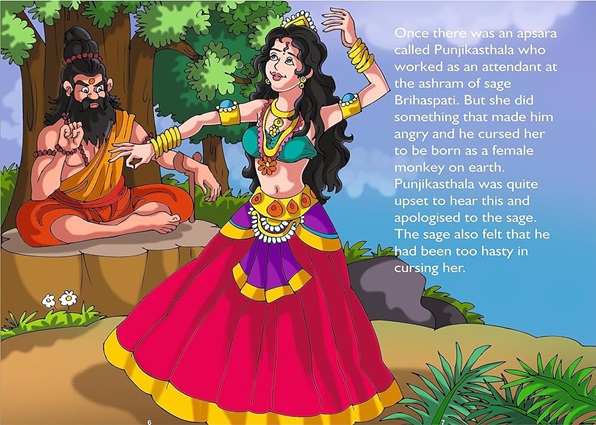
According to the legend an astoundingly beautiful and talented Apsara a celestial nymph, named Punjikasthala resided at Indra Lok. She was immensely proud of her skills and mesmerizing beauty.
Once Sage Rishi Durvasa visited king of Gods Lord Indra. He was engaged in some serious discussion with Indra and the Devas when Punjikastala kept moving in and out of Indra Sabha. Her movements caused an unnecessary distraction and the same irritated Rishi Durvasa. As per Puranic scriptures, angry Sage Durvasa cursed Punjikasthala to be a mother in order to free herself from a curse.
Punjikasthala Angered Sage Rishi Durvasa
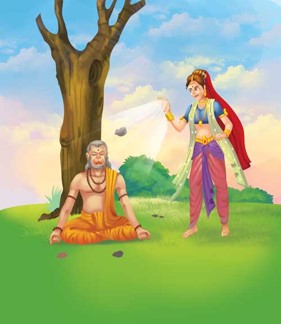
Rishi Durvasa Cursed Punjikasthala
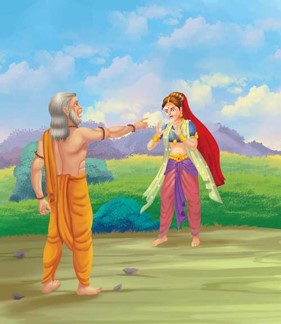
Angry Sage Rishi Durvasa cursed Punjikasthala to be born as a monkey on Earth. Devastated by hearing Durvasa’s curse, Punjiksthali pleaded to spare her from the curse. She regretted her foolishness and careless behavior. Punjiksthali prayed for forgiveness.
Moved by Punjiksthali’s lament, Rishi Durvasa altered his curse and said that she would marry a Vanara monkey king on Earth. Further, She would be the mother of a very powerful son as Hanuman and he would be the supreme dedicated devotee of Lord Rama. Later on Apsara Punjikasthala was born on Earth to a monkey King and she was named Anjana.
Rishi Durvasa Altered Curse To Punjikasthala
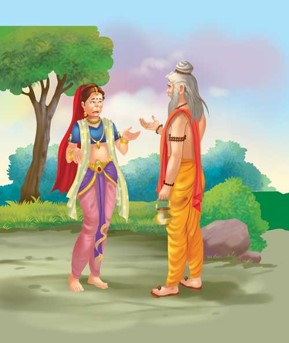
King Of God Indra Advice To Punjikasthala
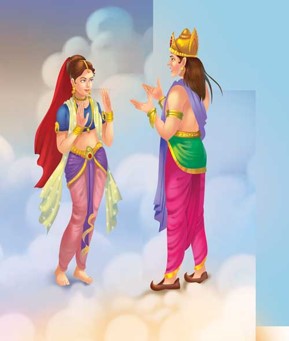
Punjikasthala was borne as Anjana and took birth as the daughter of great-souled monkey chief Kunjara. Anjana on assuming a human physique, dressed in silken clothing, and shining forth with the rarity of her beauty and nobility.
One day she witnessed a chivalrous man engaged in a fierce battle with a ferocious lion. She was enamoured by the prowess of the man who was none but Kesari, the great king of Vanaras.
The marriage between Anjana, another name of Punjikasthala, and Vanara king Kesari was solemnised. The couple prayed to Lord Shiva to get Him as their son. Shiva granted their prayer.
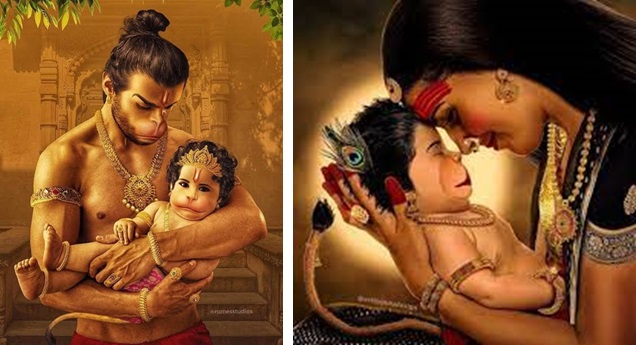
Simultaneously, King Dasharatha performed a Yajna seeking offspring, and the Wind God, Vayu, received a portion of the divine offering. Vayu shared it with Anjana, leading to her giving birth to Hanuman.
Hanuman’s birth was marked by extraordinary feats, including playful attempts to catch the sun, mistaking it for a fruit. Celestial deities blessed him with immunity and various boons, setting the stage for his divine destiny.
Hanuman, the Pawan Putra
As per another narattive, “Hanuman, the Pawan Putra” refers to Hanuman’s identity as the son of the Wind God, Vayu. The term “Pawan Putra” translates to “Son of the Wind” in Sanskrit. This association plays a significant role in Hanuman’s birth story and attributes to his divine qualities.
According to Hindu mythology, Anjana, a celestial nymph, prayed intensely to Lord Shiva for a child. Pleased with her devotion, Shiva blessed her with a son. Simultaneously, King Dasharatha performed a Yagna (sacrificial ritual) to obtain progeny, and the Wind God, Vayu, received a portion of the divine offering. Vayu then shared this with Anjana, resulting in Hanuman’s conception.
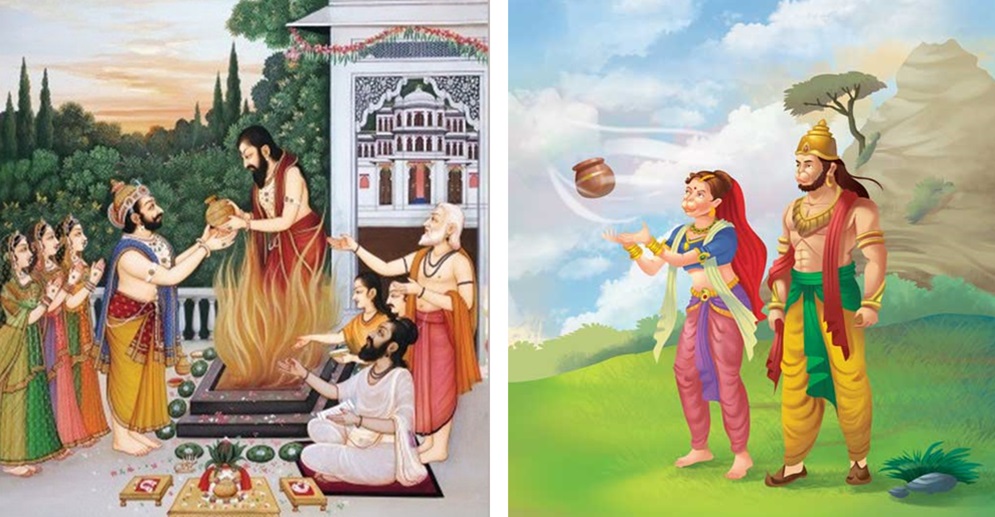
As a result, Hanuman is often called “Pawan Putra” to acknowledge his divine lineage. The association with the Wind God not only highlights Hanuman’s extraordinary birth but also underscores his exceptional strength and swiftness. In the Ramayana, Hanuman’s ability to fly swiftly, carry mountains, and leap across oceans is attributed to his parentage, making him the worthy “Son of the Wind.”
The title “Pawan Putra” also symbolizes Hanuman’s humility and unwavering devotion. Despite his immense power, he remains devoted to Lord Rama and is considered a symbol of selfless service and loyalty. This aspect of Hanuman’s identity adds depth to his character and makes him a beloved figure in Hindu mythology.
King Dasharatha of Ayodhya Performed Yajna
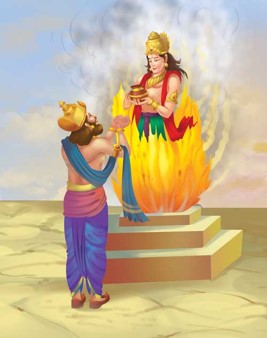
Vayu Shared Divine Payasam With Anjana
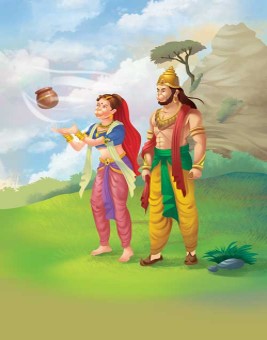
Anjana's Penance
According to the Ramayana, Anjana, a celestial nymph, was born as a monkey due to a curse. Desiring liberation, she undertook severe penance to seek the blessings of Lord Shiva. Her penance was so intense and sincere that it caught the attention of Lord Shiva.
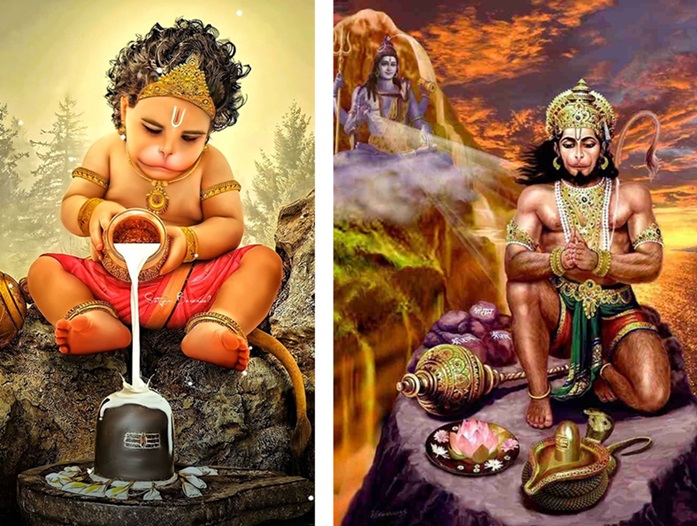
Hanuman’s connection to Shiva is symbolized by his name, which is derived from “Hanumantha,” where “Hanu” means jaw, and “mantha” means disfigured. This refers to an incident where Hanuman’s jaw was injured by a powerful blow, emphasizing his divine nature by withstanding the impact.
Hanuman, as an incarnation of Lord Shiva, exemplifies strength, devotion, and selfless service, earning him a revered place in Hindu mythology and the hearts of devotees.
Sun God's Blessings To Hanuman
One day, young Hanuman saw the sun in the sky and, thinking it was a ripe fruit, leaped to catch it. Indra, the king of gods, became alarmed and struck Hanuman with his Vajra (thunderbolt), which hit him on the jaw. However, instead of being harmed, Hanuman’s jaw remained unharmed, and he continued his playful antics.
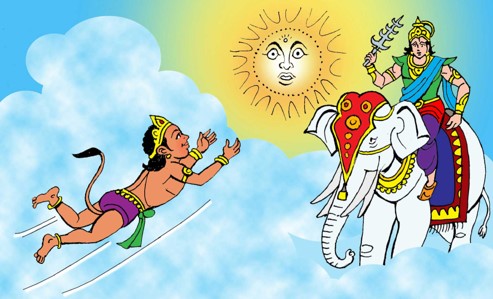
To pacify Indra, the celestial deities blessed Hanuman with various boons, including immunity from all celestial weapons, immense strength, and the ability to change his form at will. It was then that Hanuman received the name “Sankat Mochan,” meaning the reliever from troubles.
